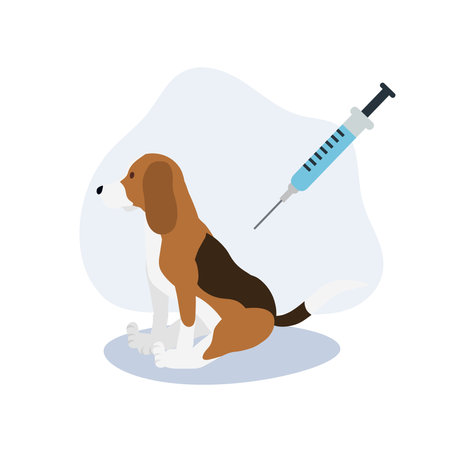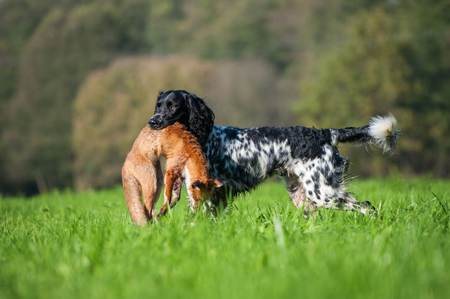Introduction to Working Dog Breeds in the UK
When you think of British life, whether it’s a bustling rural farm or a lively family home in the suburbs, working dog breeds are often at the heart of these scenes. The UK has a long and proud tradition of keeping working dogs, not only as loyal companions but also as indispensable partners in daily tasks. From the ever-energetic Border Collie herding sheep across misty hillsides to the enthusiastic Springer Spaniel flushing game during country shoots, these breeds are woven into the fabric of British culture. Each breed brings its own set of unique characteristics, shaped by generations of selective breeding for specific tasks. This deep bond between humans and their working dogs goes far beyond companionship; it’s about trust, teamwork, and shared purpose. As more families and farmers welcome these breeds into their lives, understanding their roles and requirements—including the cost and value of insuring them—has become increasingly important for responsible ownership.
2. Why Insurance Matters for Working Dogs
Working dogs are more than just pets; they are essential partners in many UK households and businesses, performing vital roles from herding livestock on rural farms to assisting individuals with disabilities or providing security services. Because of the demanding nature of their jobs, these dogs face unique risks compared to typical companion animals. Understanding these risks is the first step in recognising why specialist insurance is not a luxury but a necessity for those who rely on their dogs’ skills and well-being.
Specific Risks Facing Working Dog Breeds
The physical and mental demands placed on working dogs often expose them to higher chances of injury, illness, or even liability issues. For example, sheepdogs might be at risk of leg injuries while navigating uneven terrain, while security dogs could sustain wounds during confrontations. Assistance dogs may develop repetitive strain injuries due to daily tasks like opening doors or fetching objects. Here’s a quick comparison of common risks among different types of working dogs:
| Type of Working Dog | Common Risks |
|---|---|
| Herding (e.g., Border Collie) | Sprains, fractures, heat exhaustion, encounters with livestock |
| Security (e.g., German Shepherd) | Bite wounds, trauma, stress-related conditions |
| Assistance (e.g., Labrador Retriever) | Joint issues, repetitive strain injuries, allergies |
The Importance of Specialist Insurance
Standard pet insurance policies often fall short when it comes to the needs of working dog breeds. Specialist insurance for working dogs is designed to address the specific challenges these animals face in their line of duty. It typically covers not only accident and illness expenses but also third-party liability—a crucial consideration if your dog accidentally injures someone or causes property damage while working.
For Owners Relying on Their Dogs’ Abilities
If you depend on your dog for daily farm operations, personal assistance, or business security, an unexpected injury or illness can disrupt more than just your routine—it can impact your livelihood and independence. Specialist cover offers peace of mind by ensuring that veterinary bills and related costs do not become a barrier to prompt care and recovery.
Conclusion: A Sensible Investment
In summary, insuring a working dog isn’t just about managing risk—it’s about safeguarding the partnership between owner and animal that underpins so many aspects of British rural and urban life. With the right policy in place, you can focus on your work or family life knowing your loyal companion is protected against the unique hazards they face every day.

3. Typical Insurance Costs and What Influences Them
When it comes to insuring working dog breeds in the UK, the price you pay can vary dramatically based on several key factors. Understanding these influences is crucial for owners who want to balance quality cover with sensible budgeting. Let’s break down what really drives those insurance premiums.
Breed: The Foundation of Premiums
In Britain, some working breeds are simply more expensive to insure than others. For example, Border Collies and Springer Spaniels—favourites among sheep farmers and search-and-rescue teams—might attract lower premiums due to their generally robust health. On the other hand, German Shepherds or Rottweilers may cost more, as insurers view them as higher risk, partly due to their size and potential hereditary conditions.
Age: Young Pups vs. Senior Workers
Puppies often start out with lower premiums but as your dog ages, the costs tend to rise. This is because older dogs are more prone to illness and injury—a common concern among owners of seasoned gun dogs or herding animals who have seen many seasons in the field. Insurers will factor in your dog’s date of birth right from the quote stage.
Workload and Type of Work
The nature of your dog’s work also plays a significant role in shaping insurance costs. A sheepdog actively herding livestock across rugged terrain faces different risks compared to a therapy dog visiting care homes. Dogs involved in physically demanding or hazardous tasks (such as police K9 units or security dogs) usually attract higher premiums due to increased chances of injury or accident on the job.
Geographic Region: North vs. South
Where you live in the UK matters too. Owners in rural Scotland might pay less than those in Central London, where veterinary costs and claim rates are typically higher. Regional factors such as local vet fees, prevalence of certain diseases, and even crime rates can all impact what you pay annually for your working dog’s cover.
History of Claims: Loyalty Rewarded?
If you’ve claimed on your policy before—perhaps for a torn paw pad after a long day on the moors—your renewal premium may increase. Insurers assess risk based on past claims history, so a string of claims could push up future costs. Conversely, a clean record might help keep premiums down, rewarding careful owners who prioritise preventive care.
By considering these factors when shopping for insurance, UK owners can make informed decisions that suit both their budget and their hard-working canine companions’ needs.
4. Coverage Options Tailored for Working Dogs
When it comes to insuring working dog breeds in the UK, owners have a wide variety of policy options designed specifically for the unique risks these dogs face. Understanding the range of cover available is crucial to making an informed decision and managing costs effectively.
Types of Insurance Cover Available
Working dogs—such as sheepdogs, gun dogs, and security dogs—are exposed to different hazards compared to companion pets. This means their insurance needs are more specialised, and insurers in the UK have responded with tailored policies. Here’s an overview:
| Type of Cover | Description | UK Market Popularity |
|---|---|---|
| Accidental Injury | Covers vet fees if your dog is injured while performing duties, e.g., herding or guarding. | Highly popular; considered essential for active working breeds. |
| Illness | Protects against the costs of treating sicknesses, whether work-related or not. | Standard in most comprehensive policies. |
| Third-Party Liability | Covers legal costs if your working dog causes injury or damage to someone else or their property. | A must-have for many rural and urban handlers; some farm insurance bundles include this. |
| Loss of Use | Pays out if your dog is no longer able to work due to injury or illness. | Valued by professional handlers and farmers reliant on a dogs abilities. |
| Theft or Straying | Covers loss if your working dog is stolen or goes missing while on duty. | Increasingly important, especially for high-value breeds like gundogs. |
Popular Policy Features in the UK Market
Many UK insurers offer customisable packages so that you only pay for what you need. For example, NFU Mutual and Petplan are well-known for their flexible cover levels, allowing you to add extras such as complementary treatments (physiotherapy or hydrotherapy), boarding kennel fees if you’re hospitalised, and even advertising/reward costs should your dog go missing. It’s also common for policies to include a helpline for emergency situations—something highly valued by busy farming families.
What to Look Out For
When selecting a policy, be sure to check:
- Exclusions: Some policies exclude injuries sustained during certain types of work—always read the fine print.
- Annual Limits: Make sure the payout limits align with potential veterinary costs for large working breeds.
- No Claims Discounts: Many British insurers reward claim-free years with reduced premiums—worth considering if your dog has a good track record.
A Family Perspective
If your working dog is also a family companion, look into policies that combine elements of both pet and working animal insurance. This ensures comprehensive protection both at home and in the field—a practical approach embraced by many rural households across the UK.
5. Real-Life Experiences from British Working Dog Owners
When it comes to working dog insurance, nothing speaks louder than real stories from UK families and farmers who rely on their dogs every single day. For many, these animals are more than pets—they’re indispensable members of the workforce and family. Take the Harrisons in Cumbria, for example. Their border collie, Jess, suffered a serious leg injury while herding sheep. Thanks to comprehensive insurance, they avoided a hefty vet bill and Jess was back at work within weeks. As Mrs. Harrison recalls, “Without insurance, we might’ve had to make a very difficult decision about Jess’s future. It truly saved us both emotionally and financially.”
Meanwhile in Devon, farmer Tom Evans faced a different challenge when his spaniel Max developed a chronic health condition. The regular treatments would have been a huge financial strain on the farm’s budget. However, with the right policy in place, most of the costs were covered. Tom shared, “It wasn’t just about the money—it was peace of mind knowing Max could get the care he deserved without us having to cut corners elsewhere on the farm.”
Urban working dog owners also benefit greatly from insurance. The Smith family in Manchester have two Labradors trained for therapy work with local schools. After one pup needed surgery following an accident, their insurance covered not only medical bills but also provided compensation for lost working days during recovery. Mr. Smith said, “Our dogs help so many children and families each week—we couldn’t imagine them being out of action for months because we couldn’t afford treatment.”
These experiences underline how proper insurance isn’t just a box-ticking exercise—it’s a safety net for unexpected events that can disrupt daily life and income alike. Across Britain, from rural hillsides to city neighbourhoods, having robust cover has helped countless families and farmers protect both their dogs’ wellbeing and their own livelihoods.
6. Tips for Finding Affordable and Comprehensive Cover
When it comes to insuring working dog breeds in the UK, finding a balance between cost and comprehensive cover can be challenging. However, with a bit of research and some savvy decision-making, you can protect your canine companion without breaking the bank. Here are some practical tips that have worked for our family and many other UK dog owners:
Compare Policies from Multiple Providers
Don’t just settle for the first quote you receive. Use online comparison tools specifically designed for UK pet insurance or reach out directly to several local insurers. Remember, premiums can vary widely depending on the breed, age, and work type of your dog, as well as your location (for example, premiums may be higher in London than in rural areas).
Check What’s Actually Covered
Read the policy documents carefully—sometimes what looks like a bargain has exclusions that could cost you dearly later. Pay special attention to:
- Routine care: Some policies exclude dental treatment, vaccinations, or regular check-ups.
- Working-related injuries: Not all insurers cover injuries sustained while your dog is working or training.
- Lifetime vs. annual cover: Lifetime policies often provide better long-term value if your dog develops a chronic condition.
Understand Exclusions and Excesses
Every policy comes with its own set of exclusions. For working dogs, common exclusions include injuries during competitions or specific working activities. Make sure you understand what’s not covered so you’re not caught off-guard by unexpected costs. Also, consider the excess (the amount you pay towards a claim)—a higher excess might lower your premium but could be costly if you need to make frequent claims.
Work with Local Insurers and Specialists
Some insurers specialise in working dogs or certain breeds commonly used for farm work or service roles. Local brokers may offer tailored advice based on regional risks (like livestock encounters in rural Scotland versus urban hazards in Manchester). It’s worth having a chat with them—many families have found better deals this way than through big-name brands.
Ask About Multi-Pet Discounts and Loyalty Schemes
If you have more than one dog, especially in a family setting where pets are both companions and workers, ask about multi-pet discounts or loyalty rewards. These can make a significant difference over time and are quite popular among UK households.
Review Your Policy Annually
Your circumstances—and those of your dog—can change. Review your insurance policy each year around renewal time to ensure it still fits your needs and budget. Don’t be afraid to switch providers if you find better value elsewhere; in the competitive UK market, loyalty doesn’t always pay off!
By taking these steps, UK families can secure reliable protection for their working dogs without overspending—a win-win for both your peace of mind and your four-legged team member.
7. Conclusion: Investing in Peace of Mind
Choosing to insure a working dog breed in the UK is far more than just a numbers game; it’s about embracing responsible ownership and ensuring long-term wellbeing for both your animal and your family. Working dogs are cherished not only for their unique skills and loyalty, but also because they often become an integral part of our households. The financial outlay for comprehensive insurance may seem substantial at first glance, but when you consider the potential vet bills, public liability risks, and unexpected mishaps that can occur in active working lives, insurance becomes a practical necessity.
In the British context, where our countryside traditions and working breeds have deep roots, insuring your dog reflects a commitment to their health and happiness. It’s about safeguarding the years of companionship and service these remarkable dogs provide—whether they’re herding sheep on a rural farm or assisting with security or therapy work in urban settings. Families who invest in robust insurance policies find reassurance knowing that help is at hand should anything go wrong, reducing stress and preventing tough financial choices during emergencies.
Ultimately, insuring your working dog breed is an act of care that extends beyond mere pounds and pence. It’s an investment in peace of mind, allowing you to focus on building memories with your canine companion while fulfilling your responsibilities as a UK dog owner. By prioritising protection today, you’re ensuring many more healthy, happy tomorrows together.


